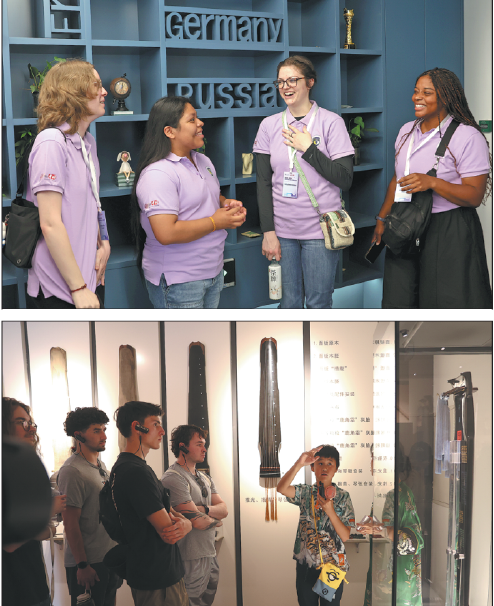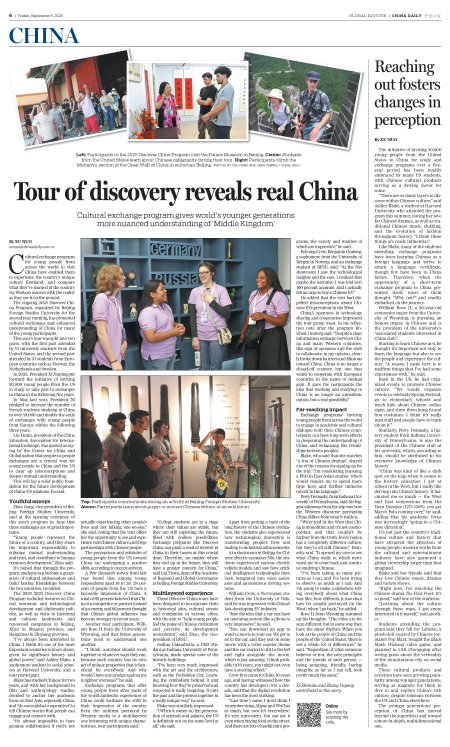
Online See more by scanning the code.

Left: Participants in the 2025 Discover China Program visit the Palace Museum in Beijing. Center: Students from the United States learn about Chinese calligraphy during their tour. Right: Participants climb the Mutianyu section of the Great Wall of China in suburban Beijing.

Top: Participants communicate during an activity at Beijing Foreign Studies University. Above: Participants learn about guqin, or ancient Chinese zithers, at an exhibition.
Cultural exchange programs for young people from across the world to visit China have enabled them to experience the country's unique culture firsthand, and compare what they've learned of the country via Western sources with the reality as they see it on the ground.
The ongoing 2025 Discover China Program, organized by Beijing Foreign Studies University for the second year running, has promoted cultural exchanges and enhanced understanding of China for many of the young participants.
This year's tour was split into two parts, with the first part attended by 13 university students from the United States, and the second part attended by 37 students from European countries such as Norway, the Netherlands and Sweden.
In 2023, President Xi Jinping put forward the initiative of inviting 50,000 young people from the US to study or take part in exchanges in China in the following five years.
In May last year, President Xi pledged to increase the number of French students studying in China to over 10,000 and double the scale of exchanges with young people from Europe within the following three years.
Liu Limin, president of the China Education Association for International Exchange, was quoted as saying by the Center for China and Globalization that people-to-people exchanges are a crucial way for young people in China and the US to clear up misconceptions and deepen mutual understanding.
This will lay a solid public foundation for the future development of China-US relations, he said.
Youthful envoys
Zhao Gang, vice-president of Beijing Foreign Studies University, said at the opening ceremony of this year's program in June that these exchanges are of great importance.
"Young people represent the future of a country, and they share the important responsibility to enhance mutual understanding and trust, and contribute to human common development," Zhao said.
It's hoped that through the program, students can become a generation of cultural ambassadors and build lasting friendships between the two countries, he added.
The 2025 2025 Discover China Program included lectures on China's economic and technological development and diplomatic policies, as well as visits to historical and cultural landmarks and renowned companies in Beijing, Xi'an in Shaanxi province, and Hangzhou in Zhejiang province.
"I've always been interested in China. I think it's one of the most important countries to know about, given its significant history and global power," said Ashley Blake, a sophomore student in social sciences at Harvard University, and a tour participant.
Blake has studied Chinese for two years, and with her background in film and anthropology studies, decided to anchor her academic focus on East Asia, especially China, and "do some global cooperation" to tell Chinese stories that people can engage and connect with.
"It's almost impossible to have genuine collaboration if you're not actually experiencing other people's lives and not talking one-on-one," she said, noting that the tour offers her the opportunity to see and experience real Chinese culture and forge partnerships with Chinese people.
The perceptions and attitudes of young people from the US toward China are undergoing a positive shift, according to recent surveys.
A Pew Research survey from last year found that among young respondents aged 18 to 29, 28 percent of people from the US have a favorable impression of China. A total of 69 percent believed that China is a competitor or partner instead of an enemy, and 66 percent thought that China's global influence has become stronger in recent years.
Another tour participant, William Rose II from the University of Wyoming, said that future generations need to understand one another.
"I think countries should work together in whatever ways they can, because each country has its own set of unique properties that is beneficial for everybody. And why would I have any grudge against my neighbor overseas?" he said.
Exchange programs that offer young people from other parts of the world authentic experiences of China could facilitate the shift in their impression of the country from the uniform portrayal by Western media to a multilayered one brimming with unique characteristics, tour participants said.
"College students are at a stage where their values are stable, but they are still exploring the future, filled with endless possibilities. Exchange programs like Discover China can plant a seed of interest in China in their hearts at this crucial time. Therefore, no matter where they end up in the future, they will have a greater concern for China," said Liu Tiewa, dean of the Academy of Regional and Global Governance at Beijing Foreign Studies University.
Multilayered experience
These Discover China tours have been designed to incorporate visits to historical sites, cultural streets and companies in various cities, with the aim to "help young people feel the pulse of Chinese civilization and perceive its development momentum", said Zhao, the vice-president of BFSU.
Joshua Calandrella, a PhD student at Indiana University of Pennsylvania, made special note of the historic buildings.
"I've been very much impressed with the art and the architecture, such as the Forbidden City. Learning the symbolism behind it and knowing how they're preserved and respected is really inspiring. It puts the past and the present together in a really unique way," he said.
Blake was similarly impressed.
" (When it comes to) the preservation of symbols and palaces, the US is definitely not on the same level at all," she said.
Apart from getting a taste of the long history of the Chinese civilization, the students also experienced how technological innovation is transforming people's lives and leading to industrial advancements.
At a showroom in Beijing for Chinese electric carmaker Nio, the students experienced various electric vehicle models and saw how artificial intelligence technologies have been integrated into voice assistants and autonomous driving systems.
William Crow, a Norwegian student from the University of Oslo, said he was impressed with China's fast-developing EV industry.
"Just the idea that a car can have an operating system like a phone is very impressive," he said.
"You can download an app to watch a movie in your car. We got to sit in the car, and they put on some movie with a roller coaster theme and the car started to tilt to the left and right alongside the movie, which is just amazing. I think probably in 10 years, you might not even have a steering wheel."
Crow first came to China 10 years ago, and having witnessed how the country has developed over a decade, said that the digital revolution has been the most striking.
"Last time I came, I don't think I remember using Alipay and WeChat as much, but now it's everywhere. It's very convenient. You can use it even when buying food on the street. And there are lots of useful mini programs, the variety and number of which are impressive," he said.
Echoing Crow, Benjamin Graberg, a sophomore from the University of Bergen in Norway, and an exchange student at BFSU, said: "At the Nio showroom I saw the technological insights and the cars. I realized that maybe the narrative I was told isn't 100 percent accurate. And I actually felt an urge to buy a Chinese EV."
He added that the visit had dispelled misconceptions about Chinese EVs prevalent in the West.
China's openness in technology sharing and cooperation impressed the tour group most. In his reflection note after the program finished, Graberg said: "Despite a clear information embargo between China and many Western countries, this sign of openness and the wish to collaborate, in my opinion, clearly broke down barriers and illusions toward China. China is no longer a closed-off country, but one that wants to cooperate with European countries in the name of mutual gain. It gave the participants the idea that working and studying in China is no longer an unrealistic option, but a real possibility."
Far-reaching impact
Exchange programs inviting young people from across the world to engage in academic and cultural dialogue with their Chinese counterparts can have long-term effects in deepening the understanding of China and enhancing the friendships between peoples.
Blake, who said that she watches "a ton of Chinese dramas", shared one of the reasons for signing up for the trip. "I'm considering pursuing a PhD in East Asian studies, which would require me to spend more time here and further immerse myself in the language."
Perry Domasky, from Indiana University of Pennsylvania, said his biggest takeaway from the trip was how the Western discourse portraying China differs from what it really is.
"We're told in the West that China is monolithic and it's not cosmopolitan, and that couldn't be further from the truth. Every region has a completely different culture, but they're all still Chinese," Domasky said. "It opened my eyes to see what China really is, which motivated me to come back and continue studying Chinese.
"I've been taking as many pictures as I can, and I've been trying to observe as much as I can. And I'm going to make a slideshow telling everybody about what China was like, how different it was than how it's usually portrayed (in the West) when I go back," he added.
Rose II from Wyoming summed up his thoughts. "The cities are for sure different, but in some way they have the same rhythm. When you look at the people of China and the people of the United States, there is not a whole lot of differences," he said. "Regardless of what someone believes or not, the core principles and the morals of each person — being outgoing, friendly, having integrity, as far as I can tell, look pretty much the same."
xunuo@chinadaily.com.cn

